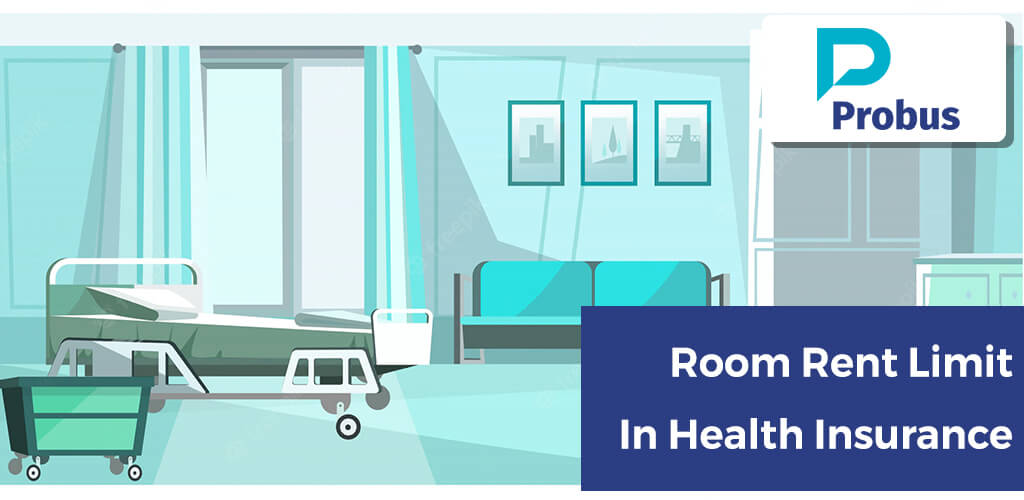Today, having health insurance is a necessity for everyone. It not only offers comprehensive protection against medical expenses the policyholder can accrue in the event of a medical emergency, but it also enables the insured individual to get free health examinations and prompt medical care for illnesses.
You should keep in mind, nevertheless, that the majority of health insurance plans have numerous restrictions and limitations. And you should be aware of these terms and conditions before purchasing the policy to prevent any unpleasant surprises when it comes to the settlement of claims. “Room rent limit” is one such phrase related to health insurance coverage.
Importance of Room Rent Limit In Health Insurance
Room rent limit is a frequent sub-limit contained in many medical insurance policies up to which your insurance company will pay the rent. You will be required to pay the additional money during the claim settlement if you choose to stay in a hospital room that costs more than the cap.
A person who is admitted to a hospital must pay daily rent or daily room charges to occupy a room or bed there. In the context of health insurance, “room rent” refers to the coverage for boarding costs or daily lodging costs that the policyholder can incur while being treated in a hospital.
The type of room and hospital a policyholder chooses have a big impact on room rent.
For instance, Viraj, an MBA professional working for Infosys, has a health insurance policy with an Rs. 5,000 room rent cap, the most amount of room rent he can claim under the policy is Rs. $5,000. If the limit is stated as “2 percent of the Sum Insured,” and he has selected Rs. 5 lakhs as the sum insured, then the maximum amount he can be charged for a room is Rs. 10,000.
Note: A ward or multiple-occupancy room has a higher room rent than a single or double occupancy room. Similar to this, the rent for rooms in private hospitals is substantially greater than the rent for similar rooms in government hospitals.
Types of Room Rent Limit in Health Insurance Coverage
You must choose wisely as a policyholder when choosing a policy with a certain kind of room rent. For your information, the most typical styles of room rent capping are listed below:
- Room Rent without Sub Limits: The most prioritised benefit of any health insurance provider is the lack of rent restrictions. You now have the much-needed freedom to select the style of room you want thanks to this perk. You can select the sort of accommodation that best suits your needs, whether it be a private suite or a general ward. Really, there are no limitations on the kind of space you can choose.
- Room Rent with Specified Room Types: Certain types of rooms are covered by some health insurance. The policyholder has a choice between a private room or a twin-sharing suite. With this function, patients can only be admitted to certain rooms.
- Co-payment on Room Rent: Co-payment refers to splitting the cost of your hospital stay with the hospital. Co-paying for a room means that you, the policyholder, and the insurance company will both be responsible for paying the room rent and any associated costs.
- Room Rent with Capping: A policyholder’s ability to claim a certain amount of room rent is typically restricted by insurance companies. The insurance provider will not agree to pay for further charges.
- Room Rent Waiver Add-on Cover: For a nominal additional cost, policyholders can add this provision to their health insurance plans at the time of purchase. With this benefit, the cap on room rent can be lifted, enabling the insured to obtain treatment without concern for the expense.
Benefits of Having No Room Rent Capping in Health Insurance
Here is the list of the potential benefits of including no room rent capping in health insurance.
- Flexibility to choose a hospital room According to Your Needs
You can receive treatment in any hospital room of your choice when you purchase a health insurance policy without a room rent cap, which is one of the biggest benefits. Each patient has unique requirements, and their alternatives may be constrained by a health insurance plan with a room rent cap. But there is no need to make concessions when one has health insurance that is free of room rent. They may opt to share a room or prefer a private one.
- Option to Choose How to Use Covered Advantages
Depending on the terms and conditions of your policy, you will be reimbursed for all costs incurred during your hospitalisation, regardless of whether you receive necessary medical care in a modest or opulent hospital room.
So, whether and how you decide to divide the sum is entirely up to you. But keep in mind that only the maximum amount insured will be paid for the charges.
- Comfortable Stay at the Hospital
You can choose to stay in a room that provides you with comfort if you are receiving medical attention or are ill.
To avoid underinsurance, it is crucial to acquire a comprehensive health insurance plan. It is therefore advised to choose a health insurance plan without a room rent cap.
How does room rent work with Health Insurance in India?
Let’s consider a complete scenario to properly understand it!
For instance,
A man, named Raj, working as an investment banker in New Delhi owns a health insurance policy with a room rent limit of Rs. 4000 per day. Due to some reason (maybe he doesn’t like Rs. 4000 per day Private room), and opts for a deluxe room that a rent of Rs. 6000 per day. When the claim is satisfied, all fees—aside from those for items with MRP—will be proportionally decreased.
| Factors | Hospital Bills | How much to pay? | Payable Amount |
| Surgery Costs | Rs. 1,00,000 | Rs.50,000 | Proportionate deduction |
| Room Charges | Rs. 40,000 | Rs. 20,000 | Proportionate deduction |
| Medical Tests | Rs. 4,500 | Rs. 2,250 | Proportionate deduction |
| Medicines | Rs. 10,000 | Rs. 10,000 | Subject to MRP product, hence no deduction |
How does Room Rent Limit Affect Your Overall Health Insurance Claim?
The insurance company will use the room rent and any relevant capping as the primary factors when determining the claim amount. Depending on whether you chose to stay in a room that was below or above the room rent cap, the claim amount will go up or down. Let’s look at an example to better understand how the room rent cap would affect the total amount of your claim:
Assume Raj bought a health insurance policy with a Sum Insured of Rs. 5 lakhs and a room rental of 1% of the Sum Insured. As a result, his policy’s actual room rent cap will be set at Rs. 5,000. Now, if he decides to stay in a hospital room with a daily rent of less than Rs. 5,000, he will be entitled to recover all hospitalization costs in full, with no deductions.
In another scenario:
However, if he chooses a room whose rent is more than ₹ 5,000 per day, then his claim amount will be deducted in equal proportion by which the room rent exceeds the room rent limit of his health insurance policy. It means that if his room rent is ₹ 7,500, then he will get only 5000/7500 i.e., only 67 percent of the total expenses incurred by you during hospitalization.
It means that if he incurs Rs. 4 lakhs during hospitalization for nearly five days, he will get Rs. 2,68,000 lakhs only (4,00,000 * 0.67) from his respective insurance provider.
Conclusion
The next step is to choose the appropriate coverage now that you are aware of what no room rent capping in health insurance entails as well as its advantages. Without health insurance, you will be financially responsible for rising medical costs and a variety of illnesses related to your fast-paced lifestyle.








